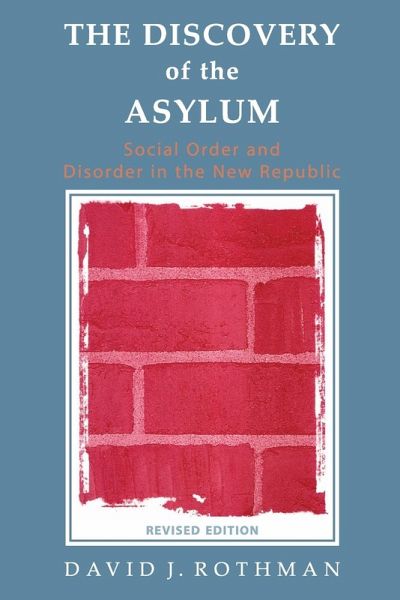
The Discovery of the Asylum
Social Order and Disorder in the New Republic
Versandkostenfrei!
Sofort lieferbar
60,99 €
inkl. MwSt.
Weitere Ausgaben:

PAYBACK Punkte
30 °P sammeln!
The Discovery of the Asylum poses the question why Americans, beginning in the 1820s and 1830s, simultaneously and confidently constructed prisons, insane asylums, reformatories, and almshouses to confine and treat their deviant and dependent population In his introduction, Rothman examines the reasons that this question is now one of the core concerns of European and American social history; analyzes the many imaginative answers that have been proposed, and evaluates their strengths and weaknesses.
Discovery explores American attitudes toward crime, madness, poverty, and delinquency, and demonstrates how these ideas shaped both the design and the routine of the new institutions. There were no available models for the asylum; it had to be imagined and fabricated with few guiding precedents. The results revolutionized the treatment of the deviant and dependent and have profoundly affected the structure of present-day society. Rothman’s book is thus a fascinating reflection of our past and a mirror on our troubled present and future.
Discovery explores American attitudes toward crime, madness, poverty, and delinquency, and demonstrates how these ideas shaped both the design and the routine of the new institutions. There were no available models for the asylum; it had to be imagined and fabricated with few guiding precedents. The results revolutionized the treatment of the deviant and dependent and have profoundly affected the structure of present-day society. Rothman’s book is thus a fascinating reflection of our past and a mirror on our troubled present and future.
This is a masterful effort to recognize and place the prison and asylums in their social contexts. Rothman shows that the complexity of their history can be unraveled and usefully interpreted. By identifying the salient influences that converged in the tumultuous 1820s and 1830s that led to a particular ideology in the development of prisons and asylums, Rothman provides a compelling argument that is historically informed and socially instructive. He weaves a comprehensive story that sets forth and portrays a series of interrelated events, influences, and circumstances that are shown to be connected to the development of prisons and asylums. Rothman demonstrates that meaningful historical interpretation must be based upon not one but a series of historical events and circumstances, their connections and ultimate consequences. Thus, the history of prisons and asylums in the youthful United States is revealed to be complex but not so complex that it cannot be disentangled, described, understood, and applied. This reissue of a classic study addresses a core concern of social historians and criminal justice professionals: Why in the early nineteenth century did a single generation of Americans resort for the first time to institutional care for its convicts, mentally ill, juvenile delinquents, orphans, and adult poor? Rothman's compelling analysis links this phenomenon to a desperate effort by democratic society to instill a new social order as it perceived the loosening of family, church, and community bonds. As debate persists on the wisdom and effectiveness of these inherited solutions, The Discovery of the Asylum offers a fascinating reflection on our past as well as a source of inspiration for a new century of students and professionals in criminal justice, corrections, social history, and law enforcement.














